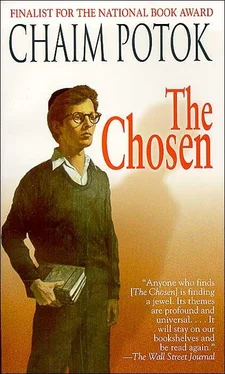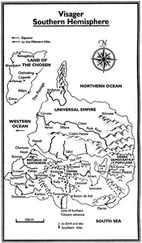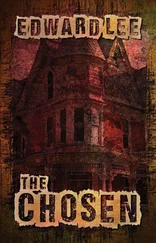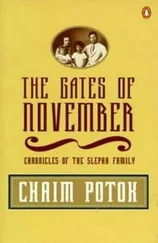He introduced me to his mother and sister. His sister 'was almost as tall as I, with dark, vivacious eyes and a face almost exactly like Danny's, except that the sculptured lines were a good deal softer. She wore a long-sleeved dress, and her dark hair was combed back severely and dangled in a thick braid behind her. She smiled at me and said, 'I know all about you, Reuven Malter. Danny never stops talking about you.' His mother was short, with blue eyes and a roundish body. Her head was covered with a kerchief, and there were faint tufts of sand-colored hair on her upper lip. They were both sitting in the living room and had apparently been reading or studying what looked to me to be a Yiddish book when we had interrupted them. I told them politely that it was nice to meet them and was rewarded with another smile from Danny's sister.
We left them and started up the stairway to the third floor.
Danny explained that the third floor contained his room, his father's study, and a conference room. The second and third floors were completely separated, just as they were in any three-story brownstone. They had thought once of moving the family to the third Floor, Danny said, so as to avoid the noise made by the people who were constantly climbing the stairs to see his father. But his mother wasn't well, and a three-Floor climb would be too much for her.
I asked him how his brother was feeling.
'All right, I guess,' he told me. 'He's asleep now.'
Danny took me through the third-floor rooms. They were identical with the ones in which my father and I lived. Danny's bedroom was located exactly where my father's bedroom was, the kitchen had been left intact – to serve the visiting dignitaries tea, Danny said with a grin – the bathroom was next to the kitchen, the study was where my father's study was – except that one of its walls had been knocked out so that it also included what in our apartment was my room – and the living room contained a long glass-topped conference table and leather chairs. Danny took me into the conference room first – we went through the outside hallway door – then into his room, which had a narrow bed, a bookcase full of old Hebrew and Yiddish books, and a desk cluttered with papers. A Talmud lay open on top of the papers. The walls were white and bare. All the walls were white and bare. I saw no photographs or paintings anywhere, neither on the floor where his family lived, nor here on the floor where he lived and his father worked.
We stood outside his father's study, and Danny knocked softly on the door. 'He doesn't like me to barge in on him when he's in there,' he whispered with a grin. His father said to come in, and we went in.
Reb Saunders sat behind a massive, black wood, glass-topped desk, wearing a black caftan and a tall, round, black skullcap. He was sitting in a straight-backed red leather chair with intricately carved wooden arms. A single light bulb glowed white beneath its ceiling fixture. The study, with its additional room, seemed enormous. A thick red carpet covered its floor, and its walls were lined with glass-enclosed wooden bookcases jammed tight with books. There were books everywhere – on the two wooden chairs near the desk, on the desk itself, on the wooden file cabinet that stood near the door, on cardboard boxes piled in a comer, on the small wooden stepladder, on the black leather easy chair that stood in another comer, even on the window seat. Many of the books were bound in black, red, and brown leather. One book had been bound in white, and it stood out prominently on a shelf among the black-bound books around it. Danny told me later that it contained the sayings of the Ba'al Shem Tov and had been presented to his father as a gift on his fiftieth birthday by the members of his congregation. All the books seemed to be in Hebrew or Yiddish, and many of them were very old and in their original bindings. There was a musty odor in the room, the odor of old books with yellow leaves and ancient bindings.
Reb Saunders told us to clear the books off the two chairs near the desk. The desk stood in almost the exact spot where my father had his desk. Danny sat at his father's right, I at his left.
Reb. Saunders wanted to know about my eye. I told him it wam't bothering me at all and that I was supposed to see the doctor this Monday morning. He understood I was not permitted to read. I nodded. 'So you will listen,' he told me, playing with an earlock. 'You are a good mathematician. Now we will see what you know about more important things.' He said it with a smile on his lips, and I did not feel it as a challenge. I knew I could not match him and Danny in the breadth of their knowledge, but I wondered if I might not be able to keep up with them in terms of depth. Rabbinic literature can be studied quantitatively or qualitatively – or, as my father once put it, horizontally or vertically. The former involves covering as much material as possible, without attempting to wrest from it all its implications and intricacies; the latter involves confining oneself to one single area until it is exhaustively covered, and then going on to new material. My father, in his classes and when he studied with me at home, always used the latter method. The ideal, of course, was to be able to do both, but none of the students in my school had that kind of time available to him because of the school's heavy emphasis on English studies.
Reb Saunders had a text ofPirkei Avot open in front of him.
He began to read from it, stopping at the end of each passage. Danny and I took turns explaining. each alternating passage. I realized soon enough that the Pirkei Avot text was merely being used as a sort of jumping-off point for them, because they were soon ranging through most of the major tractates of the Talmud again. And it wam't a quiz or a quiet contest this time, either. It was a pitched battle. With no congregants around, and with me an accepted member of the family, Danny and his father fought through their points with loud voices and wild gestures of their hands almost to where I thought they might come to blows. Danny caught his father in a misquote, ran to get a Talmud from a shelf, and triumphantly showed his father where he had been wrong. His father checked the margin of the page for the textual corrections of Rabbi Elijah – the same Rabbi Elijah who had persecuted Hasidim! – and showed Danny that he had been quoting from the corrected text. Then they went onto another tractate, fought over another passage, and this time Reb Saunders agreed, his face glowing, that his son was correct. I sat quietly for a long time, watching them battle. There was an ease about them, an intimacy, which had been totally lacking from the show they had put on before the congregants last week. There was no tension here at all but a battle between equals, with Reb Saunders losing only a little less frequently than his son. And I soon realized something else. Reb Saunders was far happier when he lost to Danny than when he won. His face glowed with fierce pride and his head nodded wildly – the nod beginning from the waist and including the entire upper portion of his body, with the beard moving back and forth against his chest – each time he was forced to acquiesce to Danny's rendition of a passage or to Danny's incisive counter-questioning. The battle went on for a long time, and I slowly became aware of the fact that both Danny and his father, during a point they might be making or listening to, would cast inquisitive glances at me, as if to ask what I was doing just sitting there while all this excitement was going on: Why in the world wasn't I joining in the battle? I listened to them for a few minutes longer, and then I realized that though they knew so much more material than I did, once a passage was quoted and briefly explained, I was on almost equal footing with them. I had this time been able to retain hold of the chain of the argument – probably because there was no tension now – and so when Reb Saunders cited and explained a passage that seemed to contradict a point that had just been made by Danny, I suddenly found myself on the field of combat, offering an interpretation of the passage in support of Danny. Neither of them seemed at all surprised to hear my voice – I had the feeling they were surprised they hadn't heard it sooner – and from that point on the three of us seesawed back and forth through the infinite intricacies of the Talmud. I discovered that my father's method of teaching me Talmud and his patient insistence that I learn Talmudic grammar – I had painfully memorized an Aramaic grammar book – was now standing me in good stead. I saw allusions in passages that Danny and his father overlooked, and I resolved a contradiction with an appeal to grammar. 'Grammar!' Reb Saunders threw up his hands. 'Grammar we need yet!' But I insisted, explained, cajoled, raised my voice, gestured with my hands, quoted whatever proof texts I could remember from the grammar book, and finally he accepted my explanations. I found I was enjoying it all immensely, and once I even caught myself reading aloud from a Talmud – it was the grammatical discussion of the gender of 'derech' road, in the tractate Kiddushin before Reb Saunders realized what I was doing and told me to stop, I wasn't allowed to use my eye yet, Danny would read the passage. Danny didn't need to read the passage – he quoted it by heart with mechanical swiftness. It became clear quickly enough that though I was unequal to Danny in breadth, I was easily equal to him in depth, and this seemed to please Reb Saunders enormously. Danny and I were soon involved in a heated discussion concerning two contradictory commentaries on the same passage, and Reb Saunders sat back quietly and listened. Our argument ended in a draw; we agreed that the passage was obscure and that as it stood it could be explained either way.
Читать дальше












